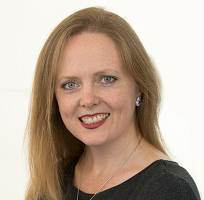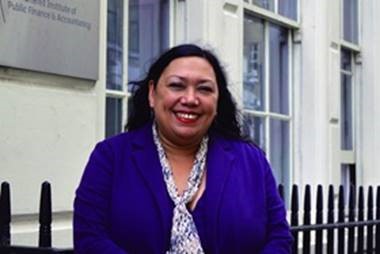The Data Changemakers series is a set of interviews and interactions with people who have spent their careers working in or around data and data management initiatives. They have a vision for the data journey and we want to understand what they have learnt and how that drives what they do today. What are their war stories and what advice can they give others embarking on thejourney?

Kate Tickner, Entity Group, kate.tickner@entitygroup.com
This article was previously published here.

Rachael Tiffen is Senior Manager (Financial Crime & Fraud -public and corporate) at Grant Thornton UK LLP. She is responsible for several national strategies for tackling fraud in the public sector won the Stella Walsh Award 2017 for long term commitment to preventing fraud.
Please describe a little about your own background and you ended up working with data?
My background was working in the public sector and for local authorities for a number of years as a Head of Audit and Counter Fraud in 6 or 7 London Boroughs. In 2009 I moved to the National Fraud Authority (then part of the Home Office). At that time there was no national strategy for tackling fraud in local government and there was very little use of data to tackle fraud generally.
I got involved in the Smarter Government initiative and worked in collaboration with business to help local government solve fraud.
“We decided to set up some pilots with private sector organisations to help local authorities use data better to tackle fraud. We ended up with 33 pilots running in different areas.”
Large organisations worked with councils to use data in different ways for example Fujitsu and Southwark on false student data. There were many others including ones to cover Council tax, single person discount data, data matching etc.
“We proved the point because we showed that we saved about £11 million in a year just via the pilots.”
After that I went to MOD but very soon was asked to go and set up a counter fraud group at CIPFA and I also wanted to take forward the idea of using data to tackle fraud so I accepted. We met with lots of analytics companies and decided to work with BAE using Net Reveal to set up a service to deliver data analytics to the Public Sector.
What originally took you into the Fraud /Audit arena?
I had started working in a council and had reported some internal fraud cases to the fraud team. I became very interested in the process they went through to investigate so I applied for a job and got it and that’s where it started. I have a degree in English and History so this was not really in my career plan but that’s the way it worked out and has turned out to be a lengthy career so far.
What is your current role and how do you use data to fulfil it?
I now work for Grant Thornton and what I am doing is quite different to my former role. I am working in Fraud and Financial Services part of the Business Risk team. I am the lead SME for fraud risk assessments and assurance for the Public Sector and large corporates.
I have not yet scoped it out yet on data as I am only 4 weeks in – but have spoken to a number of people already and seen good capabilities in GT so far.
“I can see that some of the things they do using algorithms and detecting patterns in raw data that are not always used in the public sector for fraud , so these could be an opportunity for the future.”
Would you say that you are a business person or a technical person or something else?
I think I am a fraud technical person. I would definitely not say I was a data technical person. I know enough but it is strange the way life moves on – things have changed dramatically in my life time. There was only one computer at my school and you had to book time on that! I am a business person as well – at my former and current organisations there was an element of business activity.
“I think that bringing the two together helps you deliver better services.”
What has been the most challenging fraud project you have worked on and what data was involved? Was the project a success and why?
The biggest thing I’ve worked on was part of the CIPFA project, partnered with BAE and going around the country on roadshows in early 2015. We saw a lot of public and private organisations and built the idea of what a data analytics end to end service might look like based on what people said. We were about 6 months into this when a tender came up to build an analytics service for all 33 of the London councils. The bid took a year, there were different stages and changes to specification.. I was the fraud lead person and I had a technical lead person from BAE.
“It was very challenging and took a year to work on it – longer than having a child and more pain! However, we did win the bid and it was the largest contract that CIPFA has ever won so that part was a success, yes.”
What did you learn from the experience?
The importance of understanding the landscape and that people matter.
“It is not enough to say:“here is a product”. It’s about meeting the needs of the customer. Put yourself in their shoes, what keeps them awake at night and what will work for them practically?Not just off the shelf and working in theory, but actually working.”
We came across well because we were very enthusiastic and passionate about what we were building.
I also came to appreciate more fully that there is a lot of choice out there. There are many different vendors who are offering a lot of products which leads to confusion about the differentiation between data matching and data analytics. What needs to be complex and what does not?
“Some organisations may not equipped to deal with the commercial offering landscape so there is a gap there in terms of simplifying what things are.”
What do you think are the key trends in fraud data management today and how do you think they will change the way we all do business?
“Probably the biggest thing in my area is GDPR. Everyone is really concerned about how it will affect them. However, a lot of it is an extension of what people are doing at the moment.”
There needs to be a demystification process. A lot of it is about what you are doing with your data – who is responsible for it, how secure is it and about what else should you be doing with it e.g. personal data on children. Also new time frames to acknowledge.
“In a way the very fact that people are talking and worrying about GDPR means at least they are thinking about how best to use and protect their data.”
Staffing is another area I think we are seeing change. There are a lot of people who are learning on the hoof as I have done.
“How do you employ people on a project that you then have to manage who are more technically equipped than you? You have to get your own understanding up to speed while employing an enterprise architect or technical analyst to specialise. That is quite hard to do.”
Keeping up to date is very challenging but you have to do it or you won’t get the right people on your teams. You need to understand basic processes and get the full span on your team to deliver your project. There is definitely a gap out there for case studies with accompanying process maps for all the questions you need to ask before you realise at the end that you have not asked the right thing and have to go back to change something.
What advice would you give to someone embarking on a large data-related fraud project today?
I would say that you need to understand that it is not just about data – it’s people that matter. Understand stakeholders and where they fit in a stakeholder map. Lots of people play lots of parts in a data project. Where do they fit in the jigsaw? Understand the landscape and the client’s needs and the objectives of the project.
You have to be authentic. Understand what will be good for them. If you are working with someone and it is a success then other people will buy it or use it.
“If you are working with someone then understand what their journey is and help them to deliver it so they have ownership of it – that is really important.”
Are there any particular skills or qualifications you consider to be vital to your success?
I think I would say that I always take the time to listen to what the client wants and understand how what I can provide meets their needs. I try to understand the motivators for the project and what the desired outcomes are. I think you need to make an investment in understanding and listening and being transparent about what you can and can’t do and what might work.
“A long time ago someone described me as a “boundary spanner” because I was able to make lots of organisations and people work together to achieve a common outcome or goal.”
This includes putting together the right team, being honest, understanding needs and objectives, being technically able, not over-promising.
If client is “wrong” in your opinion you can use case studies or industry examples to suggest different ways of doing things and show the outcomes eg What it looks like and what it will take to get there.
“People go into a project thinking it is simpler or more complicated than it really is and you can help them see that. Build a reputation for being a credible supportive partner.”
Given the current drive to encourage more young girls into technical/scientific roles, why should young women in particular consider a career in a data management related area?
I had my own thoughts about this but also asked my 14-year-old daughter. What she said is that they should consider it because it is interesting and because it is new.
“I think [my daughter] is right because there are a lot of new initiatives happening and opportunities for women to be at the forefront of data management and shape things going forward.”
Someone commented that there were only men with me at my recent leaving do – I had not noticed but I guess that fraud and data and analytics might be perceived as a male thing. If you look at the KODAK story about data disruption – they failed to spot changes in perception in enough time. We need to spend more time investing in getting women involved in data at school which would enable them to get into it and excited about it. If women are not up to date with it they will get left behind.
“We need to make young girls realise that they are using data and dealing with technology every day. Change perceptions of what they do already in a more social and omnichannel way in their everyday life to see that they are already working with data.”
How can we engage them and get them seeing this early on?
What are you best known for?
I am best known for probably 2 things – the first one would strategy for fraud prevention in local government. When I joined the NFA I was lucky enough to be asked to research and create the first national strategy for local government and take it through government and get ministers to sign it off. I was then asked by the government, when I was at CIPFA, to write the next one. This is unusual and I am therefore known for it in most local governments around the country. The second thing would be the win for the CIPFA contract with the local councils in London – the biggest contract we ever won.
“I should add that last summer I won a lifetime achievement award for countering fraud – this is a great honour but it feels like it’s over and really I feel that the best years are yet to come!”
What do you like doing outside of your working life?
I like reading a lot. I really love Russian novels and I’m quite into Victorian Gothic novels – my favourite is The Moonstone by Wilkie Collins. I have started taking photographs and have thought about publishing some – buildings and churches and different times of day and night and from different perspectives. The Hawksmoor churches are particularly fascinating to me.
People talk to me to exchange ideas on all aspects of business development, content creation and relationship building around data management and digital transformation challenges. I’ve helped external customers with a variety of problems including GDPR and Single View of Customer and internal customers struggling with managing disparate teams or how to generate joint content or go-to-market strategies.
I am currently undergoing my own digital transformation learning all about digital marketing including SEO, Content, Mobile, Social, Affiliate and B2B marketing via an IDM Professional Diploma course. In tandem I’m applying it to Entity Group’s business so watch our social posts, website and branding to see if you can spot where it’s working and where it’s not and let me know? It’s all related to having data – good, bad or ugly data – and how it can be applied to different goals. I’d love to hear your point of view and discuss any data challenges you are having to see if I can help or if Entity Group can.
Copyright Kate Tickner, Entity Group


